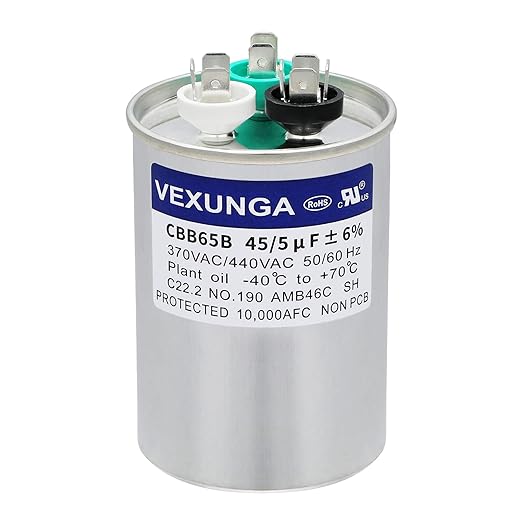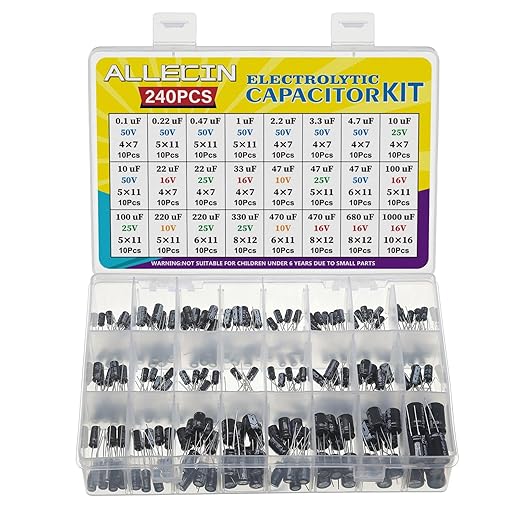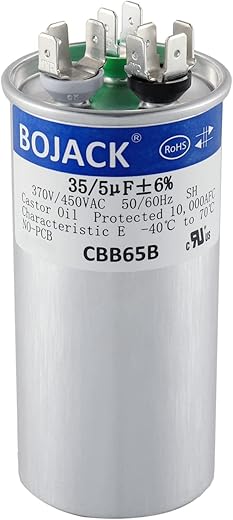When the summer heat hits, the last thing you want is for your air conditioner to falter. You rely on it to keep your home comfortable, but have you ever stopped to consider the components that make this possible? One crucial part of your HVAC system that often goes unnoticed is the capacitor. If you’ve ever felt confused about what capacitors do or how they impact your cooling system, you’re not alone. In this blog post, we’ll break down the essential role of air conditioner capacitors, explore their functions and various types, and help you recognize the warning signs of failure. By understanding these components, you’ll be better equipped to maintain your air conditioning system and ensure it runs efficiently all summer long. Let’s dive in!



What is an Air Conditioner Capacitor?
Air conditioner capacitors are vital electrical components that play a crucial role in the functionality and efficiency of your cooling system. Understanding what these capacitors do can help you appreciate their importance and identify potential issues in your air conditioning unit.



Basic Function of Air Conditioner Capacitors
At its core, a capacitor is an electrical device that stores energy. It works by accumulating electrical charge and releasing it when needed, enabling various components of an air conditioning system to operate effectively. In the context of an air conditioner, capacitors are primarily used to start and run the compressor and fan motors.
- Starting Capacitors: These capacitors provide an extra boost of energy to start the motor. Once the motor reaches a certain speed, the starting capacitor disengages and the run capacitor takes over.
- Run Capacitors: Unlike starting capacitors, run capacitors are designed to stay engaged while the air conditioning unit is operating. They help maintain a steady flow of energy to keep the compressor and fan running efficiently.
How Capacitors Integrate with Air Conditioning Systems
Capacitors are integral to several key components in an air conditioning system:
- Compressor: This is the heart of your AC unit, responsible for compressing refrigerant and circulating it through the system. A malfunctioning capacitor can prevent the compressor from starting, leading to inadequate cooling.
- Fan Motors: Both the outdoor and indoor fan motors rely on capacitors to operate effectively. The run capacitor ensures that the fans maintain optimal speed, which is critical for proper airflow and heat exchange.
Practical Examples of Air Conditioner Capacitors
To illustrate how capacitors function within specific air conditioning units, let’s take a look at a few examples:
- Trane XR14: This unit features a dual run capacitor that supports both the compressor and the outdoor fan motor. If the capacitor fails, you may notice reduced cooling performance or hear a humming noise when the unit tries to start.
- Carrier Infinity 24ANB1: This model uses a high-quality run capacitor that enhances efficiency and performance. An expired capacitor can cause the compressor to cycle on and off repeatedly, leading to increased energy consumption and potential system damage.
Benefits of Maintaining Your Air Conditioner Capacitor
Regular maintenance of air conditioner capacitors can lead to several benefits, including:
- Increased Efficiency: Well-functioning capacitors ensure the compressor and fan motors operate smoothly, reducing energy costs.
- Longevity of Equipment: By preventing motor strain, capacitors help extend the lifespan of your air conditioning unit.
- Consistent Cooling Performance: A reliable capacitor can help maintain consistent temperatures throughout your home, providing comfort when you need it most.
Signs of a Failing Capacitor
Recognizing the signs of a failing capacitor can save you from costly repairs down the line. Look out for the following symptoms:
- Humming Noise: A humming sound coming from the unit can indicate that the compressor is trying to start but is unable to do so due to a faulty capacitor.
- Inconsistent Cooling: If certain areas of your home are warmer than others, it could be a sign that the fan motor isn’t operating properly.
- Frequent Tripping of Circuit Breaker: A capacitor that’s on its way out may create electrical issues that can trip your circuit breaker.
Key Capacitor Types and Specifications
Here’s a quick comparison of common capacitor types used in air conditioners:
| Capacitor Type | Purpose | Typical Voltage Rating | Common Brands |
|---|---|---|---|
| Starting Capacitor | Boosts motor startup | 120V – 330V | Universal, Mars |
| Run Capacitor | Maintains motor operation | 370V – 440V | GE, Dayton, Supco |
By understanding the role and importance of air conditioner capacitors, homeowners can take proactive steps in maintaining their air conditioning systems, ensuring better performance and longevity for their units.
Types of Air Conditioner Capacitors
Air conditioning systems rely heavily on various components to ensure optimal performance. One such vital component is the capacitor, which plays a crucial role in powering the unit. Let’s dive into the different types of capacitors commonly found in air conditioning units, examining their specific functions and the significance they hold in maintaining an efficient cooling system.
Start Capacitors
What They Are
Start capacitors are temporary power boosters that provide the necessary torque to the compressor motor during startup. Without enough initial power, the compressor may struggle to begin its operation, leading to potential damage or failure.
Importance in the AC System
- Boosts Initial Power: Start capacitors give the compressor the extra push it needs to overcome inertia and start running.
- Protects the Motor: By ensuring that the motor receives sufficient power at startup, these capacitors help in protecting it from overheating or damage.
Practical Example
One popular start capacitor is the Supco SPP6, which is designed for various air conditioning units. It can be used in both residential and commercial applications and is capable of providing a significant boost during startup.
Run Capacitors
What They Are
Run capacitors are designed to provide continuous power to the motor throughout its operation. Unlike start capacitors, which only function during the initial startup phase, run capacitors enhance efficiency and help maintain a steady performance once the AC unit is running.
Importance in the AC System
- Improves Efficiency: Run capacitors help in reducing the workload on the compressor motor, making the system run more smoothly and efficiently.
- Enhances Longevity: By assisting with the continuous operation of the motor, run capacitors can significantly extend the life of the AC unit.
Practical Example
The MARS 12630 Run Capacitor is a well-regarded product in the HVAC community. With a capacitance of 30 µF, it is specifically designed to enhance the performance of various air conditioning systems, ensuring that the motor runs efficiently and consistently.
Dual Run Capacitors
What They Are
As the name suggests, dual run capacitors serve a dual purpose—they are designed to power both the compressor and the fan motor simultaneously. These capacitors are typically used in systems where efficiency and space-saving measures are paramount.
Importance in the AC System
- Space Saving: Since they combine the functions of both run capacitors into one unit, they reduce the clutter of multiple components.
- Enhanced Performance: By providing the required power to both motors, dual run capacitors ensure that the AC unit can operate at optimal performance levels without any hiccups.
Practical Example
The Genteq 97F9805 Dual Run Capacitor is a standout example of this type. With a capacitance rating of 35/5 µF, this capacitor efficiently supports both the compressor and the fan, ensuring reliable operation and energy efficiency.
Comparison of Capacitor Types
| Capacitor Type | Function | Key Benefit | Example Product |
|---|---|---|---|
| Start Capacitor | Provides startup boost | Protects motor from damage | Supco SPP6 |
| Run Capacitor | Supplies continuous power | Improves efficiency | MARS 12630 Run Capacitor |
| Dual Run Capacitor | Powers both compressor & fan | Space-saving design | Genteq 97F9805 Dual Run Capacitor |
By understanding the different types of capacitors in air conditioning units, you can appreciate their essential roles in ensuring your system runs efficiently and effectively. Whether you’re troubleshooting an existing system or considering an upgrade, knowing the specifics about start, run, and dual run capacitors can help you make informed decisions and maintain your AC unit’s health.
Signs of Capacitor Failure in Your Air Conditioner
Capacitors are crucial components in air conditioning systems, helping to manage the electrical current that starts and runs the compressor and the fan motor. When these capacitors begin to fail, it can lead to a range of problems that can affect your air conditioner’s performance. Here, we’ll explore the common symptoms of a failing air conditioner capacitor and provide practical tips for identifying these issues early.
1. Unusual Noises
One of the primary indicators of a failing capacitor is the presence of unusual noises coming from your air conditioning unit.
- Humming Sounds: If you hear a persistent humming noise, it can be a sign that the capacitor is struggling to start the motor. This is often seen in models like the Trane XR15 or Lennox XC25.
- Clicking or Popping: These sounds can indicate that the capacitor is trying to engage but is unable to do so, which can lead to system failure.
2. Intermittent Operation
If your air conditioner is turning on and off unexpectedly, this could signal a capacitor issue.
- Frequent Cycling: If your system runs for a short period and then shuts off, only to restart again after a few moments, it’s often due to a failing capacitor. Units like the Carrier Infinity 20 are known for their efficiency, but when the capacitor begins to fail, you may notice this erratic behavior.
- Inconsistent Cooling: A capacitor that is no longer functioning effectively may cause uneven cooling throughout your home. You might feel hot spots where the air conditioning isn’t reaching adequately.
3. Failure to Start
A complete failure to start is one of the most serious signs of capacitor failure. If your air conditioning unit doesn’t turn on at all, the capacitor could be the culprit.
- Zero Response: When you adjust your thermostat, and there’s no response from the unit, this could indicate a dead capacitor. Brands like Rheem Classic Series may exhibit this behavior if the capacitor fails completely.
- Delayed Start: If the system takes longer than usual to start up, or if it struggles with a slow start, it’s worth investigating the capacitor’s health.
Practical Tips for Identifying Capacitor Issues
Here are some practical steps you can take to help identify capacitor problems in your air conditioning unit:
- Listen Carefully: Pay attention to the sounds your AC unit makes when it operates. Unusual noises can be a clear sign of capacitor issues.
- Monitor Performance: Keep track of any changes in the cooling efficiency of your unit. If you start to notice fluctuations, it may be time to inspect the capacitor.
- Check the Thermostat: Make sure your thermostat is functioning properly. A faulty thermostat can often be confused with capacitor issues.
Importance of Addressing Capacitor Issues Promptly
Ignoring the signs of capacitor failure can lead to more extensive damage to your air conditioning system, ultimately resulting in costly repairs or replacements. Here’s what can happen if you delay addressing these issues:
- Compressor Damage: A failing capacitor can cause the compressor to overheat, leading to a potential failure that is much more expensive to repair.
- Increased Energy Bills: An inefficient AC unit due to a faulty capacitor can result in higher energy consumption, leading to increased utility bills.
- Total System Failure: If left unchecked, capacitor issues can escalate to the point where the entire air conditioning system may fail, requiring a complete replacement.
Key Symptoms to Watch For
Here’s a quick reference table summarizing the signs of capacitor failure:
| Symptom | Description |
|---|---|
| Unusual Noises | Humming, clicking, or popping sounds from the unit |
| Intermittent Operation | Frequent cycling or inconsistent cooling |
| Failure to Start | No response to thermostat adjustments or delayed starts |
By keeping an eye out for these signs and addressing any issues promptly, you can help ensure that your air conditioning unit continues to run smoothly and efficiently. If you suspect capacitor failure, contacting a qualified technician for an inspection is always a wise decision.
Key Takeaways on Capacitor Functionality and Maintenance
In conclusion, capacitors play a vital role in the efficiency and functionality of your air conditioning system. Understanding the different types, such as start and run capacitors, along with recognizing the signs of failure—like unusual sounds or inconsistent cooling—can help you maintain a comfortable environment at home. Regular maintenance checks are essential to catch potential issues early and ensure your system operates smoothly for years to come. By staying proactive with your air conditioner, you not only enhance its performance but also extend its lifespan, saving you time and money in the long run.




This article was super informative, but I still don’t get why some brands have such different capacitor lifespans. Any insight on that?
Can anyone recommend a good book or resource for learning more about HVAC systems? This was super helpful!
Thanks for your interest! A great book to check out is ‘HVAC Fundamentals’ by Robert McDowall. It covers a lot about AC systems and components.
I had a capacitor die on my Carrier AC, and it was a nightmare! But after replacing it, the system runs like a dream now!
I replaced the capacitor on my Trane unit myself after reading about it. Saved a ton of money on labor costs!
Great article! I had a capacitor fail on my old Goodman AC last summer. It was such a hassle, but now I know what to look for next time.
What brand do you recommend for replacement capacitors? I want to make sure I get something reliable.
Great question! For replacement capacitors, I usually recommend brands like Supco or Grainger—they’re known for their quality.
Could you dive deeper into how to test a capacitor? I’m curious about the tools needed and steps involved.
Absolutely! I’ll consider adding a detailed section on testing in future articles. So glad you’re interested!
I’ve heard some people debate whether to go with dual or single capacitors. What’s your take on that?
It really depends on the system! Dual capacitors are often more efficient but can be pricier. Single capacitors work well for smaller units.